Related Research Articles
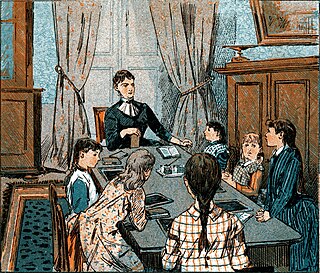
Homeschooling or home schooling, also known as home education or elective home education (EHE), is the education of school-aged children at home or a variety of places other than a school. Usually conducted by a parent, tutor, or an online teacher, many homeschool families use less formal, more personalized and individualized methods of learning that are not always found in schools. The actual practice of homeschooling can vary. The spectrum ranges from highly structured forms based on traditional school lessons to more open, free forms such as unschooling, which is a lesson- and curriculum-free implementation of homeschooling. Some families who initially attended a school go through a deschool phase to break away from school habits and prepare for homeschooling. While "homeschooling" is the term commonly used in North America, "home education" is primarily used in Europe and many Commonwealth countries. Homeschooling should not be confused with distance education, which generally refers to the arrangement where the student is educated by and conforms to the requirements of an online school, rather than being educated independently and unrestrictedly by their parents or by themselves.

Adolescence is a transitional stage of physical and psychological development that generally occurs during the period from puberty to adulthood. Adolescence is usually associated with the teenage years, but its physical, psychological or cultural expressions may begin earlier or end later. Puberty typically begins during preadolescence, particularly in females. Physical growth and cognitive development can extend past the teens. Age provides only a rough marker of adolescence, and scholars have not agreed upon a precise definition. Some definitions start as early as 10 and end as late as 26. The World Health Organization definition officially designates an adolescent as someone between the ages of 10 and 19.
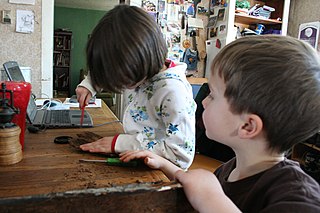
Unschooling is an informal learning method that prioritizes learner-chosen activities as a primary means for learning. Unschoolers learn through their natural life experiences including play, household responsibilities, personal interests and curiosity, internships and work experience, travel, books, elective classes, family, mentors, and social interaction. Often considered a lesson- and curriculum-free implementation of homeschooling, unschooling encourages exploration of activities initiated by the children themselves, under the belief that the more personal learning is, the more meaningful, well-understood, and therefore useful it is to the child. While unschooled students may occasionally take courses, unschooling questions the usefulness of standard curricula, fixed times at which learning should take place, conventional grading methods and standardized tests, forced contact with children in their own age group, the compulsion to do homework regardless of whether it helps the learner in their individual situation, the effectiveness of listening to and obeying the orders of one authority figure for several hours each day, and other features of traditional schooling.

John Caldwell Holt was an American author and educator, a proponent of homeschooling, and a pioneer in youth rights theory.
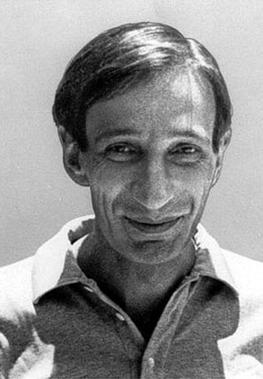
Ivan Dominic Illich was an Austrian Roman Catholic priest, theologian, philosopher, and social critic. His 1971 book Deschooling Society criticises modern society's institutional approach to education, an approach that constrains learning to narrow situations in a fairly short period of the human lifespan. His 1975 book Medical Nemesis, importing to the sociology of medicine the concept of medical harm, argues that industrialised society widely impairs quality of life by overmedicalising life, pathologizing normal conditions, creating false dependency, and limiting other more healthful solutions. Illich called himself "an errant pilgrim."

John Taylor Gatto was an American author and school teacher. After teaching for nearly 30 years he authored several books on modern education, criticizing its ideology, history, and consequences. He is best known for his books Dumbing Us Down: the Hidden Curriculum of Compulsory Schooling, and The Underground History of American Education: A Schoolteacher’s Intimate Investigation Into the Problem of Modern Schooling.
Growing Without Schooling (GWS) was a homeschooling newsletter focused primarily on unschooling and deschooling. It was founded in 1977 by educator John Holt, and was published in Boston, Massachusetts. Reportedly the first such publication in the United States, it was read worldwide, and helped to catalyze the early growth and development of the homeschooling movement. Publication ceased in 2001 after 143 issues.
Deschooling is a term invented by Austrian philosopher Ivan Illich. Today, the word is mainly used by homeschoolers, especially unschoolers, to refer to the transition process that children and parents go through when they leave the school system in order to start homeschooling. The process is a crucial basis for homeschooling to work. It involves children gradually transitioning away from their schoolday routine and institutional mentality, redeveloping the ability to learn via self-determination, and discovering what they want to learn in their first homeschool days.

South of the Border, West of the Sun is a short novel by Japanese author Haruki Murakami, first published in 1992.
Anti-schooling activism or radical education reform describes: positions that are critical of school as a learning institution and/or compulsory schooling laws; or, multiple attempts and approaches to fundamentally change the school system. People of this movement usually advocate alternatives to the traditional school system, education independent from school, the absence of the concept of schooling as a whole, or at least the right that people can choose where and how they are educated.
Patrick Farenga is an American writer and educational activist. He is known as a leading advocate of the modern homeschooling movement which started in the 1970s.
Peter Kowalke is an American unschooling advocate best known for his work on grown homeschoolers and the lasting influence of homeschooling. He was one of the first authors to explore the lasting influence that homeschooling has on a person in terms of identity, and produced a large body of work on the topic from 1994 until 2013, after which he stepped back from the homeschooling community to focus on contextualizing the Indian Advaita Vedanta philosophy for American culture.
Education Otherwise (EO) is a registered charity based in England, which aims to provide support and information for families whose children are being educated outside school. It is the largest charity organisation in the United Kingdom. The organisation derived its name from the 1944 Education Act, which stated that parents are responsible for the education of their children, "either by regular attendance at school or otherwise." This clause has been retained in subsequent Education Acts and remains a clear acceptance of the parity, and validity afforded an education,otherwise than by schooling.
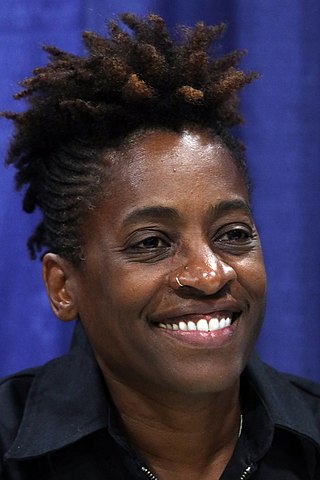
Jacqueline Woodson is an American writer of books for children and adolescents. She is best known for Miracle's Boys, and her Newbery Honor-winning titles Brown Girl Dreaming, After Tupac and D Foster, Feathers, and Show Way. After serving as the Young People's Poet Laureate from 2015 to 2017, she was named the National Ambassador for Young People's Literature, by the Library of Congress, for 2018 to 2019. She was named a MacArthur Fellow in 2020.
Adolescent sexuality is a stage of human development in which adolescents experience and explore sexual feelings. Interest in sexuality intensifies during the onset of puberty, and sexuality is often a vital aspect of teenagers' lives. Sexual interest may be expressed in a number of ways, such as flirting, kissing, masturbation, or having sex with a partner. Sexual interest among adolescents, as among adults, can vary greatly, and is influenced by cultural norms and mores, sex education, as well as comprehensive sexuality education provided, sexual orientation, and social controls such as age-of-consent laws.
Theresa Meeker Pickett is an American content creator.

Homeschooling is legal in many countries. Countries with the most prevalent homeschooling movements include Australia, Canada, New Zealand, the United Kingdom, and the United States. Some countries have highly regulated homeschooling programs as an extension of the compulsory school system; few others, such as Germany, have outlawed it entirely. In some other countries, while not restricted by law, homeschooling is not socially acceptable, or is considered undesirable, and is virtually non-existent.
Anarchism has had a special interest on the issue of education from the works of William Godwin and Max Stirner onwards.

Olivia Hastings Holt is an American actress and singer. She starred in the Disney XD series Kickin' It, Disney Channel Original Movie Girl vs. Monster, and the Disney Channel Original Series I Didn't Do It. From 2018 to 2019, she portrayed the titular role Tandy Bowen / Dagger in the Freeform series Cloak & Dagger. In 2021, she portrayed Kate Wallis in Cruel Summer.
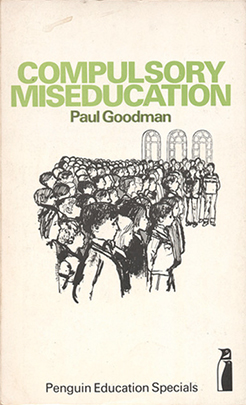
Compulsory Miseducation is a critique of American public schools written by Paul Goodman and published by Horizon Press in 1964. Already established as a social critic of American society and the role of its youth in his previous book Growing Up Absurd (1960), Goodman argues in Compulsory Miseducation against the necessity of schools for the socialization of youth and recommends their abolition. He suggests that formal education lasts too long, teaches the wrong social class values, and increasingly damages students over time. Goodman writes that the school reflects the misguided and insincere values of its society and thus school reformers should focus on these values before schools. He proposes a variety of alternatives to school including no school, the city or farm as school, apprenticeships, guided travel, and youth organizations. Reviewers complimented Goodman's style and noted his deliberate contrarianism, but were split on the feasibility of his proposals. Goodman's book was a precursor to the work of deschooling advocate Ivan Illich.
References
- ↑ Lewin, Tamar (November 29, 1995). "In Home Schooling, A New Type of Student". The New York Times. Archived from the original on October 20, 2022. Retrieved December 2, 2018.
- ↑ Growing without Schooling in Hern, M. (Ed.). (2008). Everywhere all the time: A new deschooling reader. AK Press.
- ↑ "Reflections". Growing Without Schooling. 143: 2. November–December 2001.
- ↑ Publishers Weekly review of A Sense of Self: Listening to Homeschooled Adolescent Girls, Sept 4, 1005, https://www.publishersweekly.com/9780867093575
- ↑ "PEOPLE — North Star". North Star. Retrieved 2018-12-02.
- ↑ "SusannahSheffer". SusannahSheffer. Retrieved 2018-12-02.